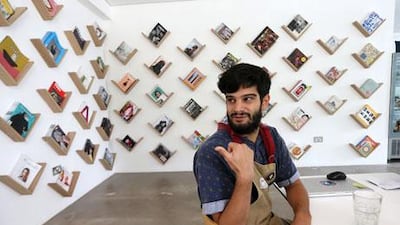DUBAI // Two Emirati brothers are bringing a world of knowledge, art and wonder to the UAE – through the power of the written word.
They have opened a cafe in Dubai offering a collection of independent, niche – and sometimes just plain odd – periodicals from around the globe.
Customers can enjoy unique and hard-to-find titles, such as New York music monthly ’SUP, the UK’s fashion and lifestyle guide Dazed and Confused, and regional publications such as the UAE’s architecture magazine WTD.
“There’s been a lot of interest,” said Kamal Rasool, the shop’s curator. “People keep saying that they’ve seen these magazines on their travels but have never seen them in the Middle East.”
The Magazine Shop, which opened in Media City last month, was set up by Emirati twins Ahmed and Rashid bin Shabib, who are also behind such artistic ventures as the Shelter and the Pavilion.
They also publish a UAE arts and culture magazine, Brownbook.
“The shop was set up to support independent publishers, especially across the Middle East and North Africa,” Rashid said.
“There’s a general appetite for curated, independent publications rather than mass-market titles you find anywhere.”
The shop already has regular customers who visit to pick up the latest uber-cool titles.
“We’re seeing people coming back more and more,” said May El Calamawy, the shop’s manager. “There’s already a loyal following.”
One of the titles available is the UAE-based independent travel magazine, We Are Here. Its editor, Conor Purcell, said the shop had an important role to play in fostering the local market.
“It’s important for independent publishers to have a retailer that values their product and I think the space can also serve as a venue for local publishers to hold events and network,” he said.
“Above all, it shows people who are interested in magazines the breadth and quality of some of the publications being released at the moment.”
About 10 of the 50 magazines on sale originate in the UAE or Middle East. Mr Rasool hopes to expand that number in the future, but a lot depends on securing distribution rights in the UAE.
“I have a list of about 300 magazines and every day I’m trying to bring them over,” he said.
“The magazines we stock are normally those with an artistic edge. They have really good paper stock and their content is great. We try to bring in interesting titles and ones we think would stand out in terms of quality and content.”
Unlike other book or magazine stores, Mr Rasool said there was no pressure on customers to buy, and people are free to sit and flick through the magazines.
“We love for people just to read them,” he said. “We’re not here so much to make money as we are to sell and preserve this culture.
“If people are happy with them and want to buy them, that’s a definite plus.”
Mr Rasool said the fact the shop had been able to open and was attracting customers was a sign of the endurance of print journalism in the age of the internet, smartphones and apps.
“Print is coming back, it’s not dying just yet,” he said.
“I think spaces like this are here to preserve that fact.”
mcroucher@thenational.ae

